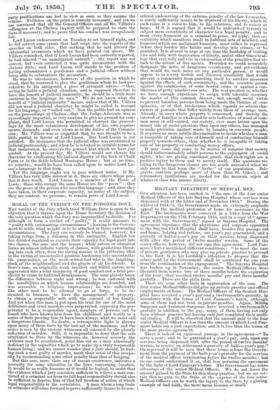MILITARY TREATMENT OF MEDICAL MEN.
OUR attention. has been invited to " the case of the four senior Medical Officers of the late Smyrna Hospital whose services were dispensed with at the latter end of November 1855." During the- winter of 1854-'5, the Government made an extremely emphatic' appeal to the medical profession at home for assistance in the East. The incitements were conveyed in a letter from the War- Department on the 17th February l855, and in a copy of "agree- ment with the Government," signed at Smyrna Hospital. The agreement stipulates that the physicians and surgeons appointed to the Smyrna Civil Hospital shall have, besides free passage out and home, lodging and rations, one year's pay guaranteed, and a. gratuity of half-a-year's pay on their services being dispensed with after the period of twelve months' service. Some of the senior officers, however, did not sign this agreement. Lord Pan- mure's letter mentioned different conditions : " to meet the case of private gentlemen who may give up private practice to proceed to the East, it is his Lordship's intention to propose that the salary paid by the Government shall be continued for one year from the termination of the engagement." The Smyrna Hospital was broken up in November; the senior Medical Officers were liberated from service two or three months before the expiration of the year ; they received twelve months' pay and three months' gratuity. These are the plain facts. There are some other facts in aggravation of the case. The four senior Medical Officers did give up private practice and official employments at home. The Medical Officers of the Scutari Hos- pital have received a year's pay and a twelvemonth's gratuity, in. accordance with the terms of Lord Panmure's letter, although, some of them had not been in private practice. Again, Militia Surgeons and Assistant-Surgeons have received a twelvemonth's, gratuity in addition to the pay, many of them having not only been without practice but having only just completed their medi- cal studies. It will be observed that the amount paid to the four- senior Medical Officers is less than the amount of which Lord Pan- mure holds out a just expectation, and it is less than the terms of the more precise agreement. There is indeed an equivocal passage in the agreement—" Ta serve a year ; and to be guaranteed a year's pay, and, upon our services being dispensed with after the period of twelve months' service, to receive on retirement a gratuity of' half-a-year's pay." On reperusal it will be seen that these terms release the Govern- ment from the payment of the half-year's gratuity for the services of the medical officer terminating- before the twelve months.; but no one could understand it so, still less perusing the agreement by the light of Lord Panmnre's letter. The Government has taken advantage of the senior Medical Officers. We do not know the amount gained to the State by this sharp practice, but we are cer- tain that no gain to the State at the expense Of the four senior Medical Officers can be worth' the injury to the State by a glaring example of bad faith, the more mean because so small.


























 Previous page
Previous page